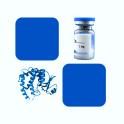
- Remove this product from my favorite's list.
- Add this product to my list of favorites.
Products
Newsletter
 |  |  |  |  |  |

Background
Granulocyte-macrophage colony-stimulating factor (GM-CSF) is also known as Colony stimulating factor 2 (granulocyte-macrophage), is a cytokine initially characterized by its ability to induce colonies of granulocytes and macrophages from myeloid progenitor cells, and is secreted by macrophages, T cells, mast cells, endothelial cells and fibroblasts. GM-CSF is a cytokine that functions as a white blood cell growth factor. GM-CSF stimulates stem cells to produce granulocytes (neutrophils, eosinophils, and basophils) and monocytes. Monocytes exitthe circulation and migrate into tissue, whereupon they mature into macrophages and dendritic cells. Thus, it is part of the immune/inflammatory cascade, by which activation of a small number of macrophages can rapidly lead to an increase in their numbers, a process crucial for fighting infection. The active form of the protein is found extracellularly as a homodimer. Human GM-CSF glycosylated in its mature form. As a part of the immune/inflammatory cascade, GM-CSF promotes Th1 biased immune response, angiogenesis, allergic inflammation, and the development of autoimmunity, and thus worthy of consideration for therapeutic target. GM-CSF has also recently been evaluated in clinical trials for its potential as a vaccine adjuvant in HIV-infected patients. The preliminary results have been promising. GM-CSF is also used as a medication to stimulate the production of white blood cells following chemotherapy.
Source
MABSol® Recombinant Biotinylated Human GM-CSF (GMF-H8214) epitope tag free, primary amine labeling (GMF-H8214) is expressed from human HEK293 cells. It contains AA Ala 18 - Glu 144 (Accession # NP_000749.2). It is the biotinylated form of ActiveMax® Human GM-CSF, Tag Free (GMF-H4214).
Predicted N-terminus: Ala 18
Molecular Characterization
The product does NOT contain any epitope tags.
The protein has a calculated MW of 14.5 kDa. The protein migrates as 18-28 kDa on a SDS-PAGE gel under reducing (R) condition due to glycosylation.
Biotinylation
The primary amines in the side chains of lysine residues and the N-terminus of the protein are conjugated with biotins using standard chemical labeling method. A standard biotin reagent (13.5 angstroms) is used in this product.
Biotin:Protein Ratio
Passed as determined by the HABA assay / binding ELISA.
Endotoxin
Less than 1.0 EU per μg by the LAL method.
Purity
>95% as determined by SDS-PAGE.
Formulation
Lyophilized from 0.22 μm filtered solution in PBS, pH7.4 with trehalose as protectant.
Reconstitution
Please see Certificate of Analysis for specific instructions.
For best performance, we strongly recommend you to follow the reconstitution protocol provided in the CoA.
Storage
For long term storage, the product should be stored at lyophilized state at -20°C or lower.
Please avoid repeated freeze-thaw cycles.
This product is stable after storage at:
-20°C to -70°C for 12 months in lyophilized state;
-70°C for 3 months under sterile conditions after reconstitution.
Bioactivity
Please refer to product data sheet.
(1) "E3 ubiquitin ligase RNF128 negatively regulates the IL-3/STAT5 signaling pathway by facilitating K27-linked polyubiquitination of IL-3Rα"
Yu, Li, Shen et al
Cell Commun Signal (2024) 22 (1), 254
(2) "Exploring in vivo combinatorial chemo-immunotherapy: Addressing p97 suppression and immune reinvigoration in pancreatic cancer with tumor microenvironment-responsive nanoformulation"
Lo, Li, Chou et al
Biomed Pharmacother (2024) 175, 116660
(3) "Oxidative phosphorylation regulates B cell effector cytokines and promotes inflammation in multiple sclerosis"
Li, Lei, Rezk et al
Sci Immunol (2024) 9 (95), eadk0865
Showing 1-3 of 33251 papers.
Follow us